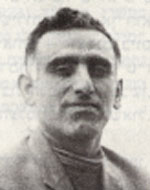Abraham, son of Rachel and Yechezkel z “l, was born on 25.6.1933 in Tel Aviv about a year after his family immigrated from Iraq. He completed his elementary studies at the Tachkemoni School in Beit Yam. Afterward, he graduated from high school in Tel Aviv. Throughout his studies, Avraham was a very good student and excelled in his analytical ability. He was a member of “Hapoel Yemiya” in Daughter of-Yam and was involved in sailing. He was also a mentor of the Hashomer Hatzair youth movement and was educated in it as a pioneering realization, for which he later chose agriculture as his life’s destiny. He dedicated his spare time to two areas, which also testify to his continued career: the chess game and the reading of science books. During this youthful period he developed a deep love for the country, its landscapes and its value as a homeland. Avraham was drafted into the IDF in early September 1951, and completed basic training in the Nahal Brigade. He continued to serve in this corps, completed an officer’s course, and was transferred, as platoon commander, from infantry unit to armored unit. He was the commander of the Armored Corps and later became commander of the camp, and Avraham was considered an excellent commander, an excellent army man, a courageous fighter and a loyal soldier, and he always listened attentively to his subordinates. For two years he worked in the kibbutz as a plantation, and in the summer of 1956 he moved to the son of Shemen Youth Village and worked there as a guide in the plantation industry, and it was only natural that he chose to keep the name Which he had acquired for himself and his uniqueness as an excellent commander, and he was the first to arrive at his unit’s stabilization post He was able to fight his wars when they were right, even before the highest commanders, and completed his studies in 1961. He was later hired as a production manager at the pharmaceutical plant Plantex. In 1967 he left his work at the Plantex and spent a whole year working as an independent researcher in his home, and even issued a patent that was registered in his name at the patent office . He then returned to the Faculty of Agriculture as a research student in the Department of Animal Feeding and Biochemistry. In 1969 he completed his doctorate and was awarded the title “Doctor”. In a direct continuation of his studies, he went on to study at the University of Liverpool, where he was evaluated by all his colleagues and research. Upon his return from the course of the course, he joined the laboratory staff in the chemistry of pesticides and toxic residues at the Volcani Institute, and soon became a senior researcher at the Institute. He frequently published works and articles in newspapers, in Israel and abroad. Some twenty articles of his work have been published in international journals and have been highly appreciated by his fellow scientists. Throughout his years of work, Avraham tried to combine the theoretical research with the rapid implementation of his results, and succeeded in doing so thanks to his tremendous energy and dedication. His professional and professional partners in Israel and abroad also admired him as a scientist with great knowledge and outstanding work ability, and also as a person, as a friend, as a very honest and modest man. The close contact between him and his co-workers, his cordial relations with him and his willingness to help with advice and action gave him many friends who admired him for his excellent qualities. He also worked in the public-scientific field, and was a member of the committee for testing the use of pesticides and their effect on the environment. Abraham’s life was dominated by enthusiasm for research, dedication to work, and the special connections he had created with his entire family.When the Yom Kippur War broke out and people were called from the synagogues, Abraham did not wait for him to be called. He volunteered immediately, even though he no longer belonged to the Armored Corps. He participated in the braking battles against the Egyptians on the Sinai front, and in the battle that took place on the 11th of Tishrei 5734 (11.10.1973), in the vicinity of the “Mars Martian” junction, a missile hit his armored personnel carrier and he was killed. “In a letter of condolence to the bereaved family, the head of the research department at the Volcani Institute wrote:” Dr. Captain son of-Aziz, an in-depth researcher, diligent, with a sense of criticism and clear thought, A researcher who cooperates with his colleagues and praises them for his kindness and modesty … ” After his death, articles were published in his memory in the booklet “The Field”, the publication of the Ministry of Agriculture, and in the journal of the Faculty of Agriculture in Rehovot; Every year, research grants are given in his name on the subject of plant protection.
